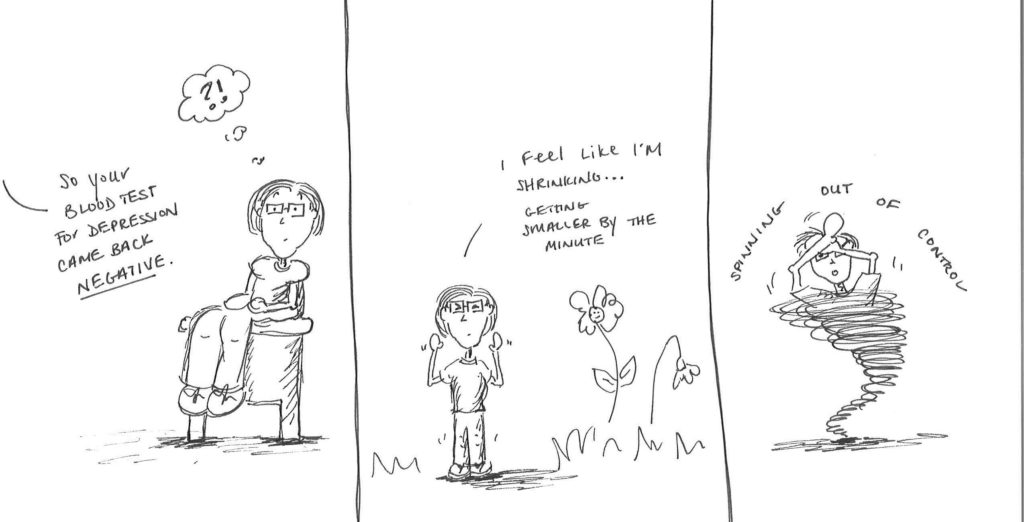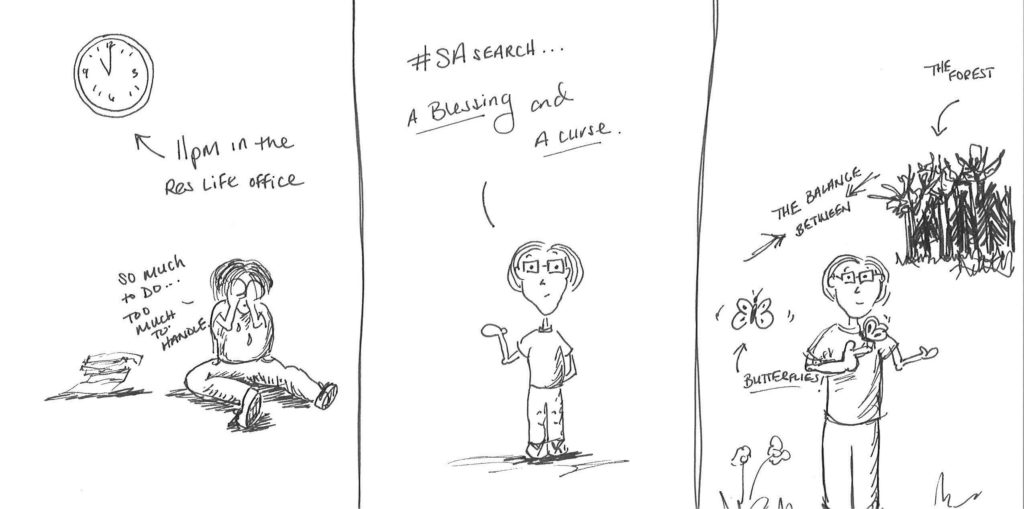by Tiffany Dyer
I’ve struggled with mental health my whole life, as far back as middle school where a teacher actually recommended I see a doctor for depression. I saw a medical doctor who ran a blood test and said I didn’t have it. I had no idea what depression was. I can’t remember going to more than three or four therapy sessions at a time and haven’t ever been able to find a therapist who is upfront with me or that I trust. Even through college I was hesitant about any therapist because I wanted different insight about my mental health, but nobody seemed to want to ask questions and dig with me. I also struggled because any campus therapist I knew personally in some capacity because of my involvement on campus, and I could not afford one off campus, even with insurance. And so I learned to cope on my own. I was always afraid to open up to yet another therapist, but without being able to do so, knew that I would never fully heal. I hid my anxiety, low self esteem, and internal hurt well. The quieter I became the more I was in danger of losing control. I learned to be patient and silent. I learned to take the feeling of endless internal energy and throw it into other activities like yard work or sculpture or writing.

After graduating I went right into a Student Affairs graduate program where I started work in housing and residential life. As grads, I and my fellow Area Coordinators checked on students with mental health conditions such as suicide ideation and hallucinations; intervened in physical fights; and confronted verbal and sometimes physically abusive students. In the two years I was there we had two off-campus shootings, a student suicide, multiple attempted suicides, a student harboring over a dozen guns in his room, sexual assaults, and numerous other miscellaneous mental health concerns and attacks. All of the graduates who served on call did not feel safe. We were all bitter and isolated ourselves from others in our own program because we knew no one else would understand and we were sure no one would know how to help us anyway. It wasn’t until the year after I graduated that the director of housing found out that we stayed at work until eleven or later at night because there was so much to do or debrief about. It wasn’t until later that he found out that the three grads who worked together in his department started meetings that would end with us sobbing together in a dark locked office. We were each others’ support, and that is all we knew.
With the weight of graduate classes and an assistantship that was mentally and physically taxing, I was ready to graduate by the end of my first semester. Everyone in the program expressed concerns that they didn’t have time to do the things they loved anymore but for me it was more. I entered an emotionally and sometimes physically abusive relationship that I would not find the strength to leave until the end of my first year. The only option in my assistantship was to keep going, doing the best I could to help students, but losing myself in the process. I knew that even if I reached out for help, nothing would happen because nobody was prepared to help to this magnitude. My friends had just as much on their plate as I did and try as we might, we weren’t enough for each other. All of these combined without therapy and without mentors around me who understood or even knew how to begin support was difficult. I have never been diagnosed for anything and so have never been formally treated for anything because of my mistrust and often the cost of finding and continuing to go to therapy. I graduated in May of 2013, exhausted, angry, mentally unwell, and still undiagnosed. I was in no place to move on to a professional position that would require me to have put the past behind me.
I have taken the past eight months away from student affairs and have searched slowly for jobs. I have been unemployed since August 2013 which has been both a blessing and a curse.
The curse: A gap in employment means incompetent, unprofessional, or otherwise red flag to so many. My most feared question is, “Why is there this gap here?” The real answer is: Because of struggling in graduate school. It’s there because people don’t just bounce back from death and rape and abuse. It’s there because I had to take the time to make myself well and figure out what I wanted to focus on. It’s there because I needed new relationships that were supportive and caring with people who listened to not just the stuff they knew, but also the hard stuff too. That gap is there because I was unwell and I needed to figure out how to trust again. I know that may not be the answer that others want to hear because student affairs is the perceived field of rainbows and butterflies. I’ve spent my time in the dark forest of student affairs, afraid of the mental health giant chained there and am just beginning to find a field again focused on growth, development, and caring.
The blessing: Through taking time away from student affairs I’ve learned more about myself and the field than I ever expected could happen in a single year. I’ve been living with a friend who works as a Residence Director on a college campus where I’ve been able to be involved in residence life and the campus. I’ve immersed myself in a kind of learning I couldn’t find in graduate school. I’ve learned about more student demographics and their struggles, the differences in east and west coast colleges in terms of program planning and disaster response, and have been able to understand how a college consortium works, among so many other things. I’ve built relationships with students who have come to me for help even though I don’t work in an official capacity and have seen them succeed because of it. I have learned what other offices outside of residence life need in order for positive collaborative relationship to work. I have found my passions and have developed a first year residential holistic wellness program that I hope to publish and share with the SA community.

And as far as my mental health, it’s still there and I still struggle a great deal but I’ve found other ways of coping when I get anxious or withdrawn or have too much internal energy. My dog is a major mood booster, but I could not always have him with me. He is not just a pet for me, he keeps me grounded so having him with me over the past eight months has helped tremendously. I’ve taken up reading and writing again. I’ve learned new skills and crafts. I am making some of my own organic bath products. I am creating book arts again and have gotten back outdoors with hiking and kayaking. The best part is that I have found student affairs to also be a mental health regulator instead of a stressor. I will spend hours of free time looking through articles and documents and speaking with others to help improve a system and programs or come up with a new one. I love this field so much with the new understanding that the rainbows and butterflies are present for me too and they work with the dark forest that doesn’t seem so dark because I’ve figured out the mental health giant that’s been chained for so long just needs firm structure and to play with a bicycle bell.
Originally posted at the Student Affairs Collective on May 19, 2014.
